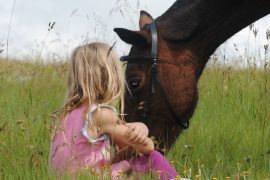The strongest overarching message that our kids need to hear is that our approval of them as a person isn’t dependent upon their behaviour. Our love is unconditional, even in the face of misbehaviour.
What’s the importance of raising our kids this way? Does it matter long-term?
First of all, it makes our jobs as parents easier. If we have fewer power struggles, everyone’s happier. Mutual agreement comes more easily. We invest the time in learning solutions to our day-to-day struggles, have less to get upset about, and everyone starts to just feel, well, more happy.
And feeling better helps our kids have happier childhoods, which are linked to all sorts of benefits: “…People who have fond memories of childhood, specifically their relationships with their parents, tend to have better health, less depression and fewer chronic illnesses as older adults, according to research published by the American Psychological Association…” (source).
Each of those benefits has a ripple effect across society. For instance, better health leads to lower health care costs for the country.
When society is healthier psychologically, physically, and financially, we all end up with a happier existence.
Is positive parenting based on evidence? Where’s the science? Where’s the proof it works?
Parents want to do what’s best for their children, so why don’t we take random parenting tips at face value? We want to see WHY we should raise our kids one way versus another. Fortunately, there’s plenty of evidence that shows authoritative methods are best not only for our children’s development, but also for our long-term relationships with our family.
A few scholarly studies that address various aspects of the science behind this positive and authoritative style are here:
An excerpt from Parenting Science:
“…Kids raised by authoritative parents are more likely to become independent, self-reliant, socially accepted, academically successful, and well-behaved. They are less likely to report depression and anxiety, and less likely to engage in antisocial behaviour like delinquency and drug use. Research suggests that having at least one authoritative parent can make a big difference (Fletcher et al 1999).
An excerpt from Parenting Style and Its Correlates:
“…Children and adolescents whose parents are authoritative rate themselves and are rated by objective measures as more socially and instrumentally competent than those whose parents are nonauthoritative…”
An excerpt from Authoritative Parenting and Adolescent Adjustment: An Ecological Journey:
“…Adolescents raised in authoritative homes are better adjusted and more competent; they are confident about their abilities, competent in areas of achievement, and less likely than their peers to get into trouble…”
From the Encyclopedia on Early Childhood Development:
“…Information and education on optimal…styles and early establishment of effective practices are both important to a child’s social adjustment and success. In many situations, adoption of a flexible and warm authoritative…style is most beneficial for a child’s social, intellectual, moral and emotional growth…”
Where can I learn more?
Tips on how to parent this way are available from many books and other resources. I recommend books from this list. Again, this isn’t about changing our kids; it’s about following parenting guidance that changes our relationship with them, and we-as adults-own that.
Our ability to teach successfully stems from our ability to grow our own thinking.
Whether you’re a mum, a dad, or another care giver, consider me your parenting guide; you’re still in charge of where to take your relationship with your child. I can help keep you on the right path. Not only will I share my research and guidance based on years of study, but I’ll also share my own relatable experience as a mum. Further, I can recommend third-party online tools and training to suit your needs.
Originally published here.
Sarah R. Moore is a published writer and the founder of Dandelion Seeds Positive Parenting. You can follow her on Facebook, Pinterest, and Instagram. Certified by the Raffi Foundation for Child Honouring, she works alongside bestselling author Elizabeth Pantley. She also spent a year observing Teacher Tom, a leading practitioner of ‘democratic play-based’ education. Her glass is half full.










